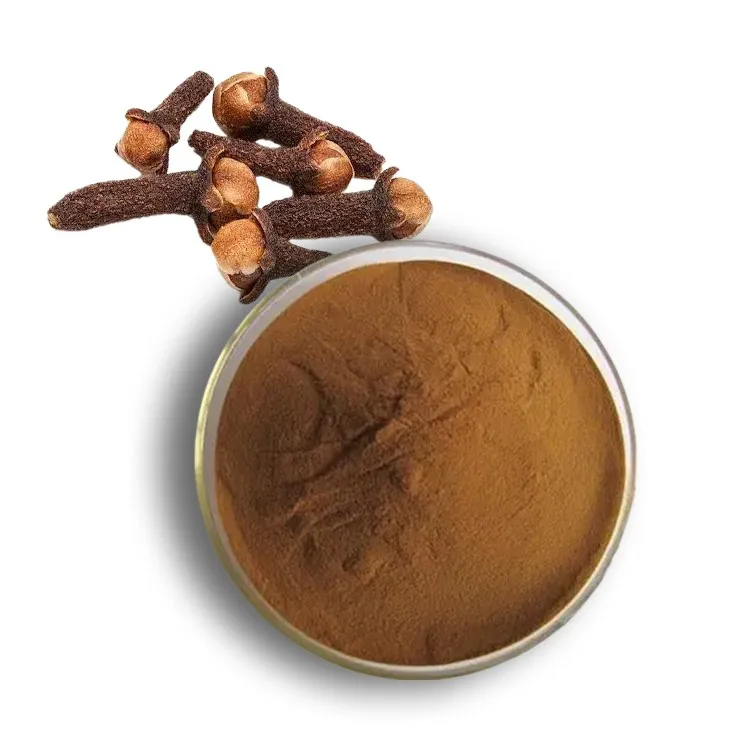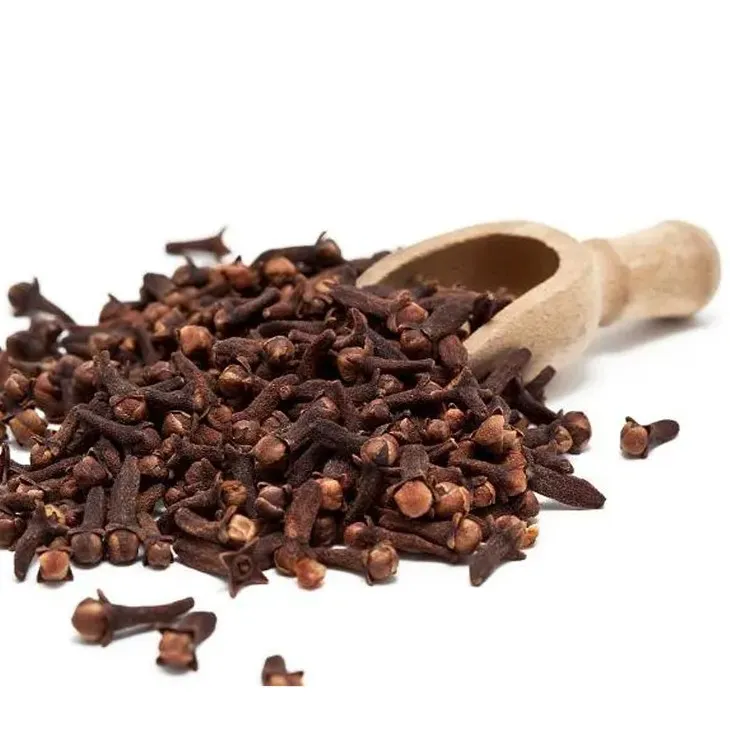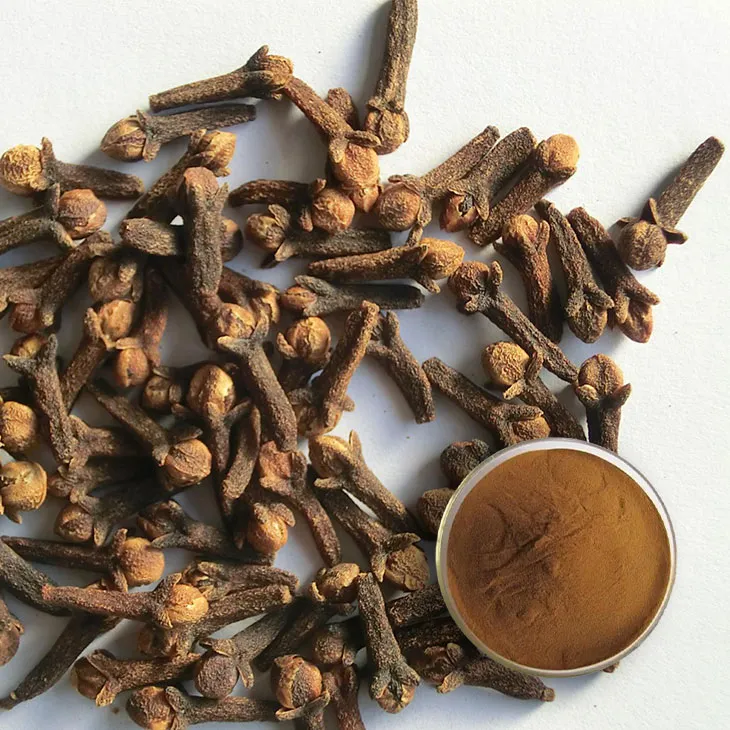- 0086-571-85302990
- sales@greenskybio.com
Clove powder suppliers.
2024-12-02

1. Introduction to Clove Powder
Clove Powder is a highly versatile and popular spice that has been used for centuries in various cultures around the world. It is derived from the dried flower buds of the clove tree, Syzygium aromaticum. The buds are carefully harvested and then processed into a fine powder, which is what we commonly refer to as Clove Powder. This powder has a distinctively strong, warm, and sweet aroma, with a slightly bitter and pungent taste. These unique flavor characteristics make it a valuable ingredient in both sweet and savory dishes.
Clove powder is not only used in cooking but also has a wide range of applications in other areas. In the field of traditional medicine, it has been known for its potential health benefits. It has antimicrobial, antifungal, and antioxidant properties. It has been used to relieve toothache, improve digestion, and boost the immune system. In the cosmetic industry, clove powder is sometimes used in skincare products due to its antibacterial properties, which can help in treating acne and other skin infections.

2. The Role of Clove Powder Suppliers
Clove powder suppliers play a vital and multi - faceted role in the market. They are the link between the growers of clove buds and the end - users, which can include individual consumers, food manufacturers, and other industries such as pharmaceuticals and cosmetics.
2.1 Sourcing of Raw Materials
One of the primary functions of a clove powder supplier is to source high - quality clove buds. This involves establishing relationships with reliable growers in different regions where clove trees are cultivated. Suppliers need to have in - depth knowledge of the best growing regions and the optimal harvesting times. For example, cloves are mainly grown in tropical regions such as Indonesia, Madagascar, and Sri Lanka. A good supplier will be aware of the specific qualities of cloves from each region and will select the most suitable source based on factors like flavor, aroma, and potency.
2.2 Processing into Powder
After sourcing the clove buds, the supplier is responsible for processing them into powder form. This is a meticulous process that requires careful handling to preserve the quality of the cloves. The buds are first dried thoroughly to reduce moisture content, which helps in preventing spoilage and maintaining the flavor. Then, they are ground into a fine powder using specialized equipment. The grinding process needs to be controlled to ensure that the powder has a consistent texture and particle size. This is important for both the appearance and the usability of the powder in various applications.
2.3 Quality Control
Quality control is a cornerstone of the role of clove powder suppliers. They must implement strict quality control measures at every stage of the production process, from raw material selection to the final packaging. Raw material selection involves carefully inspecting the clove buds for any signs of damage, mold, or inferior quality. During processing, factors such as the temperature and humidity of the drying process, as well as the cleanliness of the grinding equipment, need to be monitored. In the final packaging stage, the supplier must ensure that the powder is packaged in a way that protects it from moisture, light, and air, which can all degrade the quality of the clove powder.

3. Importance of Quality Control for Clove Powder Suppliers
Quality control is of utmost importance for clove powder suppliers for several reasons.
3.1 Meeting Customer Expectations
Customers, whether they are individual consumers or large - scale food manufacturers, have certain expectations when it comes to the quality of clove powder. They expect a consistent flavor, aroma, and potency. If a supplier fails to meet these expectations, it can lead to customer dissatisfaction and ultimately a loss of business. For example, a bakery that uses clove powder in its products expects the powder to have a specific flavor profile that will enhance the taste of their baked goods. If the powder has an off - flavor or inconsistent quality, it can affect the final product and lead to negative customer feedback.
3.2 Compliance with Regulations
In both domestic and international markets, there are strict regulations regarding the quality and safety of food products, including spices like clove powder. Suppliers need to comply with these regulations to be able to sell their products legally. This includes meeting standards for pesticide residues, heavy metal content, and microbial safety. For international trade, compliance with international food safety standards such as those set by the Codex Alimentarius Commission is essential. Failure to comply with these regulations can result in product recalls, fines, and damage to the supplier's reputation.
3.3 Maintaining Brand Reputation
A supplier's brand reputation is built on the quality of its products. By ensuring strict quality control, a clove powder supplier can build a positive reputation in the market. This can lead to increased customer loyalty, more business opportunities, and a competitive edge over other suppliers. On the other hand, a single instance of poor quality can have a significant negative impact on a supplier's reputation, which can be difficult to recover from.

4. Sourcing from Growers: The Foundation of Quality Supply
A reliable clove powder supplier often has extensive connections with growers. These connections are the foundation for obtaining fresh and pure raw materials.
4.1 Establishing Long - term Relationships
Suppliers should strive to establish long - term relationships with growers. This not only helps in ensuring a stable supply of clove buds but also enables better communication and cooperation. Long - term relationships allow suppliers to influence the cultivation practices of growers to some extent. For example, they can encourage the use of sustainable farming methods, which can result in higher - quality cloves. They can also work together to ensure timely harvesting, which is crucial for obtaining cloves with optimal flavor and aroma.
4.2 Assessing Grower Quality
When selecting growers, suppliers need to assess their quality standards carefully. This includes evaluating the growing conditions, such as soil quality, water availability, and climate. Growers should also have proper pest and disease management practices in place to ensure that the clove buds are free from contaminants. Suppliers may conduct regular inspections of the growers' farms to ensure compliance with these quality requirements. Additionally, they may require growers to provide samples for quality testing before finalizing a purchase agreement.
4.3 Supporting Grower Communities
Good clove powder suppliers also recognize the importance of supporting the grower communities. This can be done through fair trade practices, providing technical support to growers, or investing in local infrastructure. By supporting the growers, suppliers can not only ensure a sustainable supply of raw materials but also contribute to the economic development of the regions where cloves are grown. This, in turn, can lead to a more stable and reliable supply chain in the long run.
5. Compliance with International Food Safety Standards
Compliance with international food safety standards is a crucial aspect of the operations of clove powder suppliers.
5.1 Understanding the Standards
There are various international food safety standards that clove powder suppliers need to be aware of. The Codex Alimentarius Commission, for example, sets standards for food additives, contaminants, and hygiene practices. Suppliers need to understand these standards thoroughly to ensure that their products meet the requirements. This includes knowing the maximum allowable levels of pesticides, heavy metals, and other contaminants in clove powder. They also need to be familiar with the requirements for good manufacturing practices (GMP) and hazard analysis and critical control points (HACCP) systems.
5.2 Implementing Quality Management Systems
To comply with international food safety standards, suppliers need to implement quality management systems. These systems should cover all aspects of the production process, from raw material procurement to final product distribution. For example, a supplier may implement a HACCP - based quality management system, which involves identifying and controlling potential hazards at critical points in the production process. This can include steps such as raw material inspection, processing temperature control, and final product testing. By implementing such quality management systems, suppliers can demonstrate their commitment to food safety and quality to their customers and regulatory authorities.
5.3 Certification and Accreditation
Certification and accreditation are important for clove powder suppliers to prove their compliance with international food safety standards. There are various certification bodies that can provide certifications such as ISO 22000 (Food Safety Management System) for food manufacturers. Suppliers may seek these certifications to enhance their credibility in the market. Accreditation from recognized international bodies can also give suppliers an edge in international trade, as it shows that their products meet the highest quality and safety standards.
6. Cost - effectiveness and Pricing Strategies
Suppliers of clove powder need to consider cost - effectiveness in order to offer competitive prices while maintaining quality.
6.1 Cost - effective Sourcing
One way to achieve cost - effectiveness is through cost - effective sourcing of raw materials. This involves finding growers who can provide high - quality clove buds at a reasonable price. Suppliers may negotiate long - term contracts with growers to secure better prices. They can also explore different sourcing regions to take advantage of price variations. However, cost - effectiveness should not come at the expense of quality. Suppliers need to balance the cost of raw materials with the quality requirements of their customers.
6.2 Optimizing Processing Costs
Another aspect of cost - effectiveness is optimizing the processing costs. This can be achieved by using efficient processing equipment that reduces energy consumption and waste. Suppliers can also streamline their production processes to reduce labor costs. For example, they can invest in automated grinding and packaging equipment, which can not only improve efficiency but also reduce the risk of human error. By optimizing processing costs, suppliers can keep their production costs low and be more competitive in the market.
6.3 Pricing Strategies
Once the cost - effectiveness has been achieved, suppliers need to develop appropriate pricing strategies. They need to consider factors such as production costs, market demand, and competition. A common pricing strategy is cost - plus pricing, where the selling price is determined by adding a markup to the production cost. However, suppliers also need to be aware of the price sensitivity of their customers. In a highly competitive market, they may need to offer more competitive prices to attract customers. On the other hand, if their product has unique qualities or a strong brand reputation, they may be able to command a higher price.
7. Future Trends and Challenges for Clove Powder Suppliers
The clove powder supply business is not without its future trends and challenges.
7.1 Market Growth and Competition
The demand for clove powder is expected to grow in the future, driven by factors such as the increasing popularity of ethnic cuisines and the growing awareness of the health benefits of natural spices. However, this growth will also attract more players into the market, leading to increased competition. Suppliers will need to find ways to differentiate themselves from their competitors, such as by offering higher - quality products, unique packaging, or better customer service.
7.2 Sustainability Concerns
Sustainability is becoming an increasingly important issue in the food industry. Clove powder suppliers will need to address sustainability concerns, both in terms of the cultivation of clove trees and the production process. This may involve promoting sustainable farming practices among growers, reducing waste in the production process, and using environmentally friendly packaging materials. Consumers are becoming more conscious of the environmental and social impact of the products they buy, and suppliers will need to meet these expectations to remain competitive.
7.3 Technological Advancements
Technological advancements are also likely to impact the clove powder supply business. New processing technologies may emerge that can improve the quality and efficiency of clove powder production. For example, advanced drying techniques can preserve the flavor and aroma of cloves better. Suppliers will need to keep up with these technological advancements to stay ahead in the market. Additionally, digital technologies can be used for supply chain management, such as tracking the origin and quality of raw materials and ensuring timely delivery of products.
FAQ:
1. What are the main quality control measures for clove powder suppliers?
For clove powder suppliers, quality control starts from raw material selection. They must ensure the cloves are fresh and pure, sourced from reliable growers. During the processing into powder, strict hygienic conditions should be maintained. After processing, the powder needs to be tested for purity, absence of contaminants, and proper particle size. Finally, in the packaging stage, the packaging materials should be of food - grade quality to prevent any external contamination.
2. How do clove powder suppliers ensure cost - effectiveness?
To ensure cost - effectiveness, clove powder suppliers often establish long - term relationships with growers. This way, they can negotiate better prices for raw materials. They also optimize their production processes to reduce waste and increase efficiency. Bulk purchasing of raw materials and packaging supplies can also lower costs. Additionally, by streamlining their distribution channels, they can cut down on transportation and storage expenses.
3. What international food safety standards do clove powder suppliers need to follow?
Clove powder suppliers typically need to follow standards such as Codex Alimentarius. These standards cover aspects like maximum residue limits of pesticides, microbiological safety, and proper labeling requirements. They also need to comply with regulations regarding heavy metal content to ensure the clove powder is safe for consumption both domestically and in international trade.
4. How do clove powder suppliers source high - quality clove buds?
Clove powder suppliers source high - quality clove buds by partnering with reliable growers. They often conduct on - site inspections of the clove plantations to assess the growing conditions, such as soil quality, climate, and pest control measures. Suppliers may also require growers to provide samples for pre - purchase testing to ensure the buds meet their quality requirements.
5. Why is it important for clove powder suppliers to have connections with growers?
It is important for clove powder suppliers to have connections with growers because it ensures a steady supply of fresh and pure raw materials. Growers can provide the specific variety of cloves that the supplier needs for their product. Good relationships with growers also enable suppliers to influence the cultivation practices to meet quality and safety standards, and it can lead to better price negotiations.
Related literature
- Quality Assurance in Spice Processing: The Case of Clove Powder"
- "Sourcing of Spices: Best Practices for Clove Suppliers"
- "International Food Safety Standards and the Spice Industry: Focus on Clove Powder"
- ▶ Hesperidin
- ▶ Citrus Bioflavonoids
- ▶ Plant Extract
- ▶ lycopene
- ▶ Diosmin
- ▶ Grape seed extract
- ▶ Sea buckthorn Juice Powder
- ▶ Fruit Juice Powder
- ▶ Hops Extract
- ▶ Artichoke Extract
- ▶ Mushroom extract
- ▶ Astaxanthin
- ▶ Green Tea Extract
- ▶ Curcumin
- ▶ Horse Chestnut Extract
- ▶ Other Product
- ▶ Boswellia Serrata Extract
- ▶ Resveratrol
- ▶ Marigold Extract
- ▶ Grape Leaf Extract
- ▶ New Product
- ▶ Aminolevulinic acid
- ▶ Cranberry Extract
- ▶ Red Yeast Rice
- ▶ Red Wine Extract
-
Tongkat Ali Extract
2024-12-02
-
Shikone Extract
2024-12-02
-
Marigold Extract
2024-12-02
-
Camu Camu Extract
2024-12-02
-
Eyebright Extract
2024-12-02
-
melatonin extract
2024-12-02
-
Mangosteen extract powder
2024-12-02
-
Bitter Melon Extract
2024-12-02
-
Buckthorn bark extract
2024-12-02
-
Chasteberry Extract
2024-12-02





















